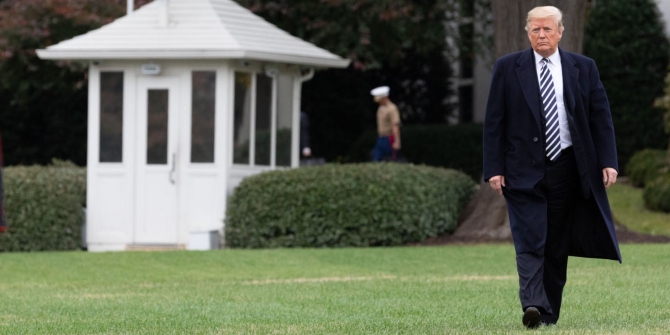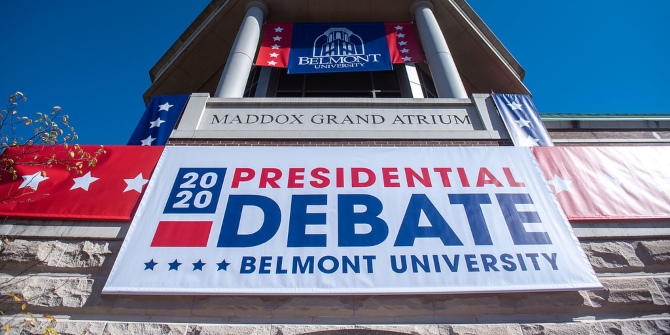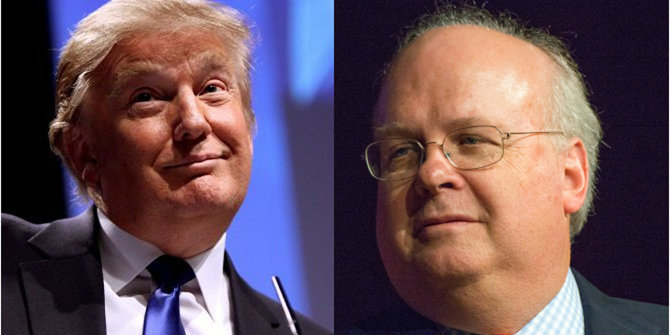 This past Friday Supreme Court Justice Ruth Bader Ginsburg passed away, creating an open seat on the nation’s highest court six weeks before the presidential election. In this Q&A, LSE US Centre Director Professor Peter Trubowitz looks at how Joe Biden’s presidential campaign may try to counter Trump’s Supreme Court pick, and the potential risks and rewards for the Republicans if they fast-track a vote on the President’s nominee.
This past Friday Supreme Court Justice Ruth Bader Ginsburg passed away, creating an open seat on the nation’s highest court six weeks before the presidential election. In this Q&A, LSE US Centre Director Professor Peter Trubowitz looks at how Joe Biden’s presidential campaign may try to counter Trump’s Supreme Court pick, and the potential risks and rewards for the Republicans if they fast-track a vote on the President’s nominee.
Is Ruth Bader Ginsburg’s death an electoral game-changer for Trump?
Probably not. While the debate over appointing Justice Ginsburg’s successor to the Court will deflect some attention from the President’s mismanagement of the pandemic and the economy, the debate will also fire up the Democratic base. The record $ 70 million haul ActBlue, the Democratic fundraising organization, recorded over the weekend in response to the news of Ginsburg’s death suggests it already is. Trump will surely make filling Ginsburg’s seat the core theme for the remainder of the campaign. Heading into the homestretch, it looks to be the best card he has in a pretty lousy hand.
What will Biden do to counter a Trump Supreme Court pick?
Assuming Trump moves forward and nominates someone this week for the Supreme Court, I would look to the Democratic nominee, former Vice President, Joe Biden to zero-in on Trump’s decision, focusing less on the individual than on the rushed process and its implications. Biden can do this in three ways. First, is to have surrogates like his running mate, Senator Kamala Harris (D-CA), relentlessly attack Trump and Senate Majority Leader Mitch McConnell (R-KY) for “playing politics” in the middle of a pandemic that has already claimed nearly 200,000 American lives. Second, is to use his huge campaign war chest to flood the airwaves in key battleground states like Arizona, Florida, and North Carolina, where there are plenty of retirees worried about health care, to remind those voters that the more conservative the Supreme Court, the more likely Obamacare will be struck down. Third, is to use the upcoming presidential debate on 29 September to explain plainly to the American people why a decision of this magnitude should be put on ice until January, when the candidate the voters have elected is sworn into office.
Should we expect a confirmation vote on a Trump nominee before the election?
It’s a risky move that could easily blow up in Republicans’ faces in any number of ways. But there are advantages for Trump in fast-tracking a vote on a nominee if McConnell has the votes in his caucus. (He can only afford to lose three — in that case he’d have to have Vice President Pence be the tie-breaking vote. If McConnell loses 4, it’s over.) For Trump, getting another conservative judge on the Supreme Court offers added insurance if contested election results end up there, which is no longer a far-fetched scenario. It seems to be what Trump is expecting and even counting on, given that he is trailing Biden in some must-win states. For McConnell, the calculation is different. The question is whether scheduling vote for or after the election improves the Republicans’ chances of holding onto the Senate. The answer is not obvious. It will stoke the Republican base in highly contested Senate seats, but a bold power grab will also likely alienate many swing voters. According to one poll over the weekend, 62 percent of Americans think the vacancy on the court should be filled by winner of the November election, including 50 percent of Republicans.
- This article is based on interview comments Professor Trubowitz gave to CNBC’s Squawk Box Europe and Bloomberg Surveillance (from 47m 30s) on 21 September 2020.
- Featured image: “Supreme Court of the United States” by Phil Roeder is licensed under CC BY 2.0
Please read our comments policy before commenting
Note: This article gives the views of the author, and not the position of USAPP– American Politics and Policy, nor of the London School of Economics.
Shortened URL for this post: https://bit.ly/2RKINMj
About the author
 Peter Trubowitz – LSE US Centre
Peter Trubowitz – LSE US Centre
Peter Trubowitz is Professor of International Relations, and Director of the LSE’s US Centre. His main research interests are in the fields of international security and comparative foreign policy, with special focus on American grand strategy and foreign policy. He also writes and comments frequently on US party politics and elections and how they shape and are shaped by America’s changing place in the world.






